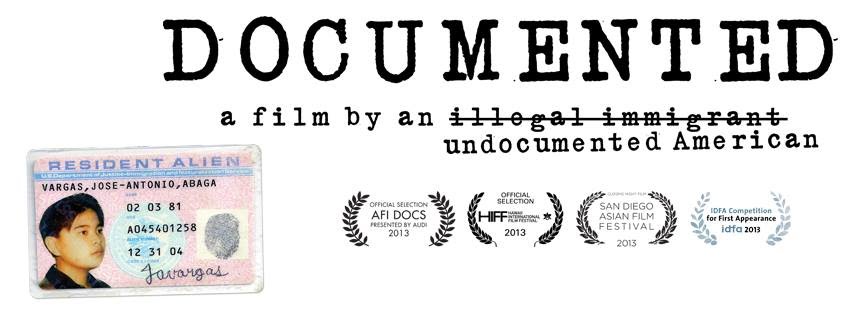Documented (2013)
Directors: Jose Antonio Vargas, Ann Lupo
Writer: Jose Antonio Vargas
Length: 89 minutes
View this film on:
- https://www.vudu.com/content/movies/details/content/613498
- https://play.google.com/store/movies/details/Documented?id=7Uv6LFtsaio
- https://itunes.apple.com/us/movie/id890601802
- https://www.amazon.com/gp/product/B00O8NQO32?tag=reelgood060d-20
- https://www.youtube.com/watch?v=7Uv6LFtsaio
Synopsis
Documented is an autobiographical documentary about Jose Antonio Vargas, a Pulitzer Prize-winning journalist who publicly revealed his status as an undocumented immigrant in 2011. At the age of 12, Vargas was uprooted from his life in the Philippines and flown to the United States, never to return. He spent the remainder of his childhood in California living with his grandparents, who had planned his abrupt departure, and he disclosed his secret to only a few trusted mentors and friends. As he gained success as a journalist, however, he felt increasingly conflicted. In 2001, the DREAM Act, which proposed a pathway to citizenship for undocumented immigrants, was introduced in the United States Senate. Although the bill didn’t pass, it sparked a movement led by a generation of young, undocumented immigrants called the Dreamers. In 2011, Vargas came out as an undocumented immigrant in The New York Times Magazine. In 2012, he was featured on the cover of TIME magazine surrounded by Dreamers for a follow-up cover story. In the same year, Dreamers, as defined by a 2010 bill passed by the House of Representatives, became eligible for work permits and were granted delays from deportation by Deferred Action for Childhood Arrivals (DACA). Vargas, who had exceeded the age limit, did not qualify. During this time, Vargas also maintained a strained relationship with his mother who still lived in the Philippines, sending her needed money but maintaining minimal contact.
Significance
While focusing on Vargas’ experiences, Documented emphasizes the shared desire of all immigrants to be seen as American. Many Americans think of the Hispanic community when hearing the term “undocumented immigrant,” and this film brings attention to the high numbers of undocumented immigrants who come from other backgrounds. In numerous scenes, Vargas expresses his preference for the term “undocumented” rather than “illegal” immigrant. He also points out that every citizen of the United States can trace their heritage back to immigrants, but that not everyone has an equal chance of becoming a citizen. Major decision factors include education, skills, wealth, and having family who already live in the country.
The filmmakers
Jose Antonio Vargas was born in Manila, the capital of the Philippines. After moving to California, he finished school and attended San Francisco State University. In 2011, he came out as an undocumented immigrant in an essay in The New York Times Magazine. In 2012, he appeared on the cover of TIME magazine, and in 2013, CNN aired Documented, which was nominated for the 2015 NAACP Image Award for Outstanding Documentary. Vargas published a best-selling memoir, Dear America: Notes of an Undocumented Citizen in 2018. He has also contributed to works on race such as MTV’s White People, a 2015 Emmy-nominated documentary that highlights various attitudes towards white privilege in America, and What the Constitution Means to Me, a 2019 Tony-nominated play that applies the United States Constitution to modern-day issues. He currently serves on the advisory board of TheDream.US, a scholarship fund for undocumented immigrant students.
Back to Asian Americans on Celluloid Timeline
Further reading and listening
Academic Articles
- Sudhinaraset, May; To, Tu My; Ling, Irving; Melo, Jason; Chavarin, Josue. “The Influence of Deferred Action for Childhood Arrivals on Undocumented Asian and Pacific Islander Young Adults: Through a Social Determinants of Health Lens.” Journal of Adolescent Health. June 2017.
Newspapers, Articles, Blogs, and Popular Books
- Do, Anh. “As Supreme Court decision looms, undocumented Asians say they must speak up or risk losing DACA.” Los Angeles Times. Nov. 30, 2019.
- Gonzales, Roberto G., Rendon-Garcia, Sarah A. “Understanding the Deferred Action for Childhood Arrivals (DACA) impact on young adults’ well-being” American Psychological Association. November 2016.
- Jordan, Miriam. “The Overlooked Undocumented Immigrants: From India, China, Brazil.” The New York Times. Dec. 1, 2019.
- O’Sullivan, Michael. “‘Documented’ movie review: Jose Antonio Vargas’s self-portrait with a mission.” The Washington Post. May 29, 2014.
Websites
- Jose Antonio Vargas [Information about Jose Antonio Vargas’ activism, journalism, film, and production experience.]
Documentaries
- PBS. “Asian Americans.” [A docuseries on historic contributions and challenges faced by the Asian American community.]

